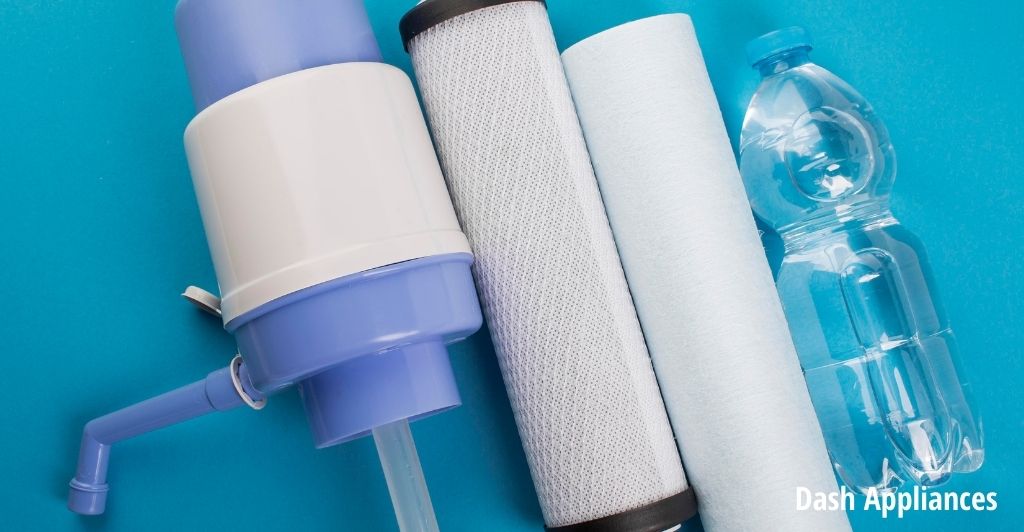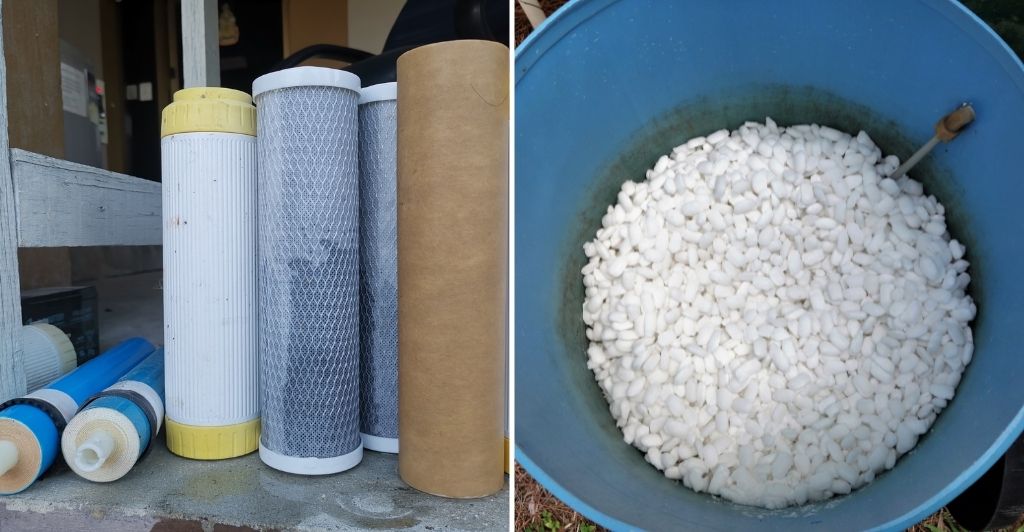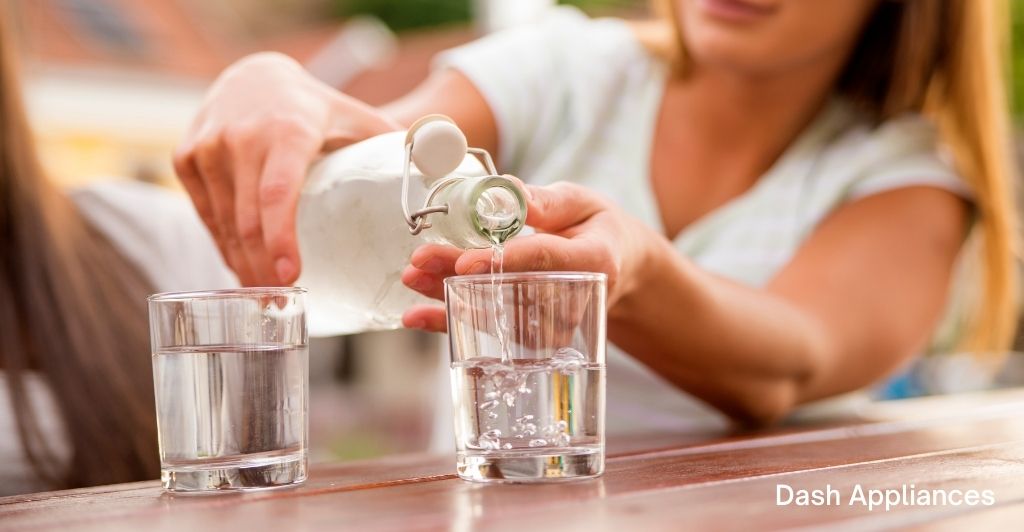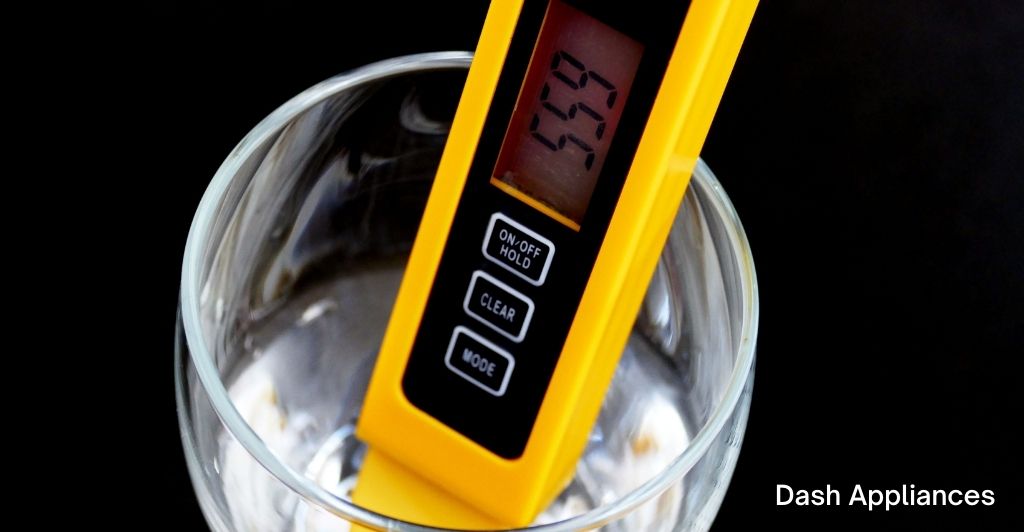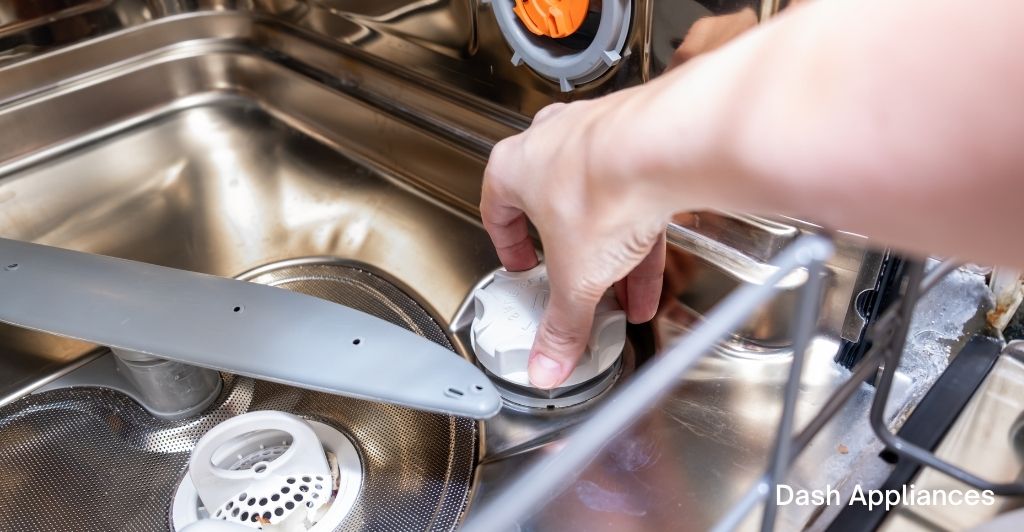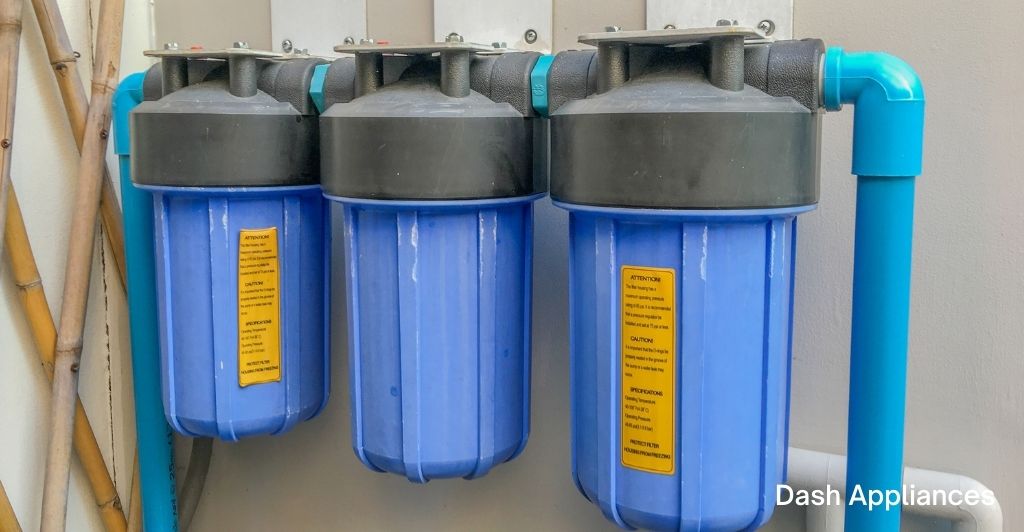Ceramic filters are relatively common in the water filtration industry. The history of ceramic filters dates back to 1827 when Henry Doulton invented the ceramic filter candle.
These filters are highly versatile in eliminating bacteria, viruses, cysts, protozoa, and other impurities naturally. A wide range of ceramic filters are available in the market, from installing the filter beneath the sink to a portable filtration system.
So in this post, we’re going to explain everything about a ceramic water filter and how ceramic filters work.
What Is A Ceramic Filter?
Ceramic filters are a particular type of filtration system that uses tiny pores of ceramic substances to remove dirt, bacteria, and debris from the water. It is an economical and effective type of water filtration system that is installed in houses and also used as potable filtering equipment.
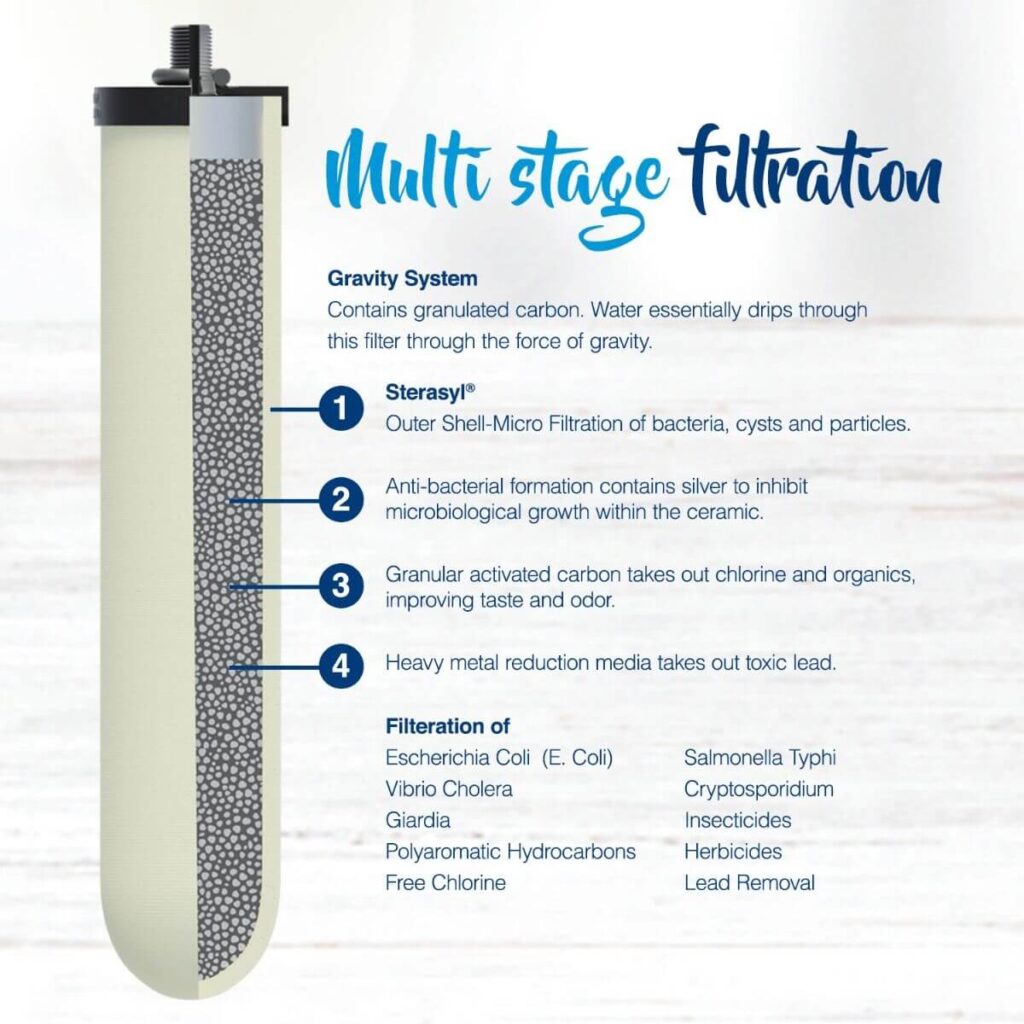
Ceramic filters consist of ceramic filter cartridges, also known as ceramic filter candles, which filter the water through the tiny pores. They can be installed everywhere, be it countertop, under the sink, in the whole house, or in large industries.
When compared to the other filtration systems, ceramic filters are cheaper and environment-friendly. It also saves the cost of replacement as the ceramic filters can be cleaned and reused.
When To Use A Ceramic Water Filter?
A ceramic water filter is commonly used for drinking water. It is an excellent choice for under-sink or countertop filters as it is cost-effective and requires less maintenance.
If you are thinking of traveling, gravity-fed filters are the perfect choice for clean drinking water. You can even filter stream water and make it potable to drink. These filters are also ideal for small spaces.
What Does A Ceramic Water Filter Remove?
Ceramic water filters are very constructive in eradicating harmful contaminants from the water. For example, they can remove the following pathogens from the water:
- Residues: The tiny pores of the ceramic water filters remove matters like dirt, dust, and debris effectively.
- Bacteria: Ceramic filters are relatively efficient in eliminating bacteria from the water. As the water passes through the ceramic filter, bacteria of even less than one micron are filtered out. Additionally, bacterias like E. coli, salmonella, shigella, and other microscopic cysts like Cryptosporidium and Giardia are too large to pass through these filters and hence, get stuck in the ceramic shell.
- Opacity/Turbidity: These filters remove the discoloration in water and make it crystal clear for drinking.
- Chlorine: Chlorine is widely found in the drinking water in cities. It makes the water smell unpleasant and tastes bitter. The activated carbon in the carbon water filter removes chlorine from the water, reimposing the freshness of the water.
- Heavy Metals: Heavy metals like mercury, lead, zinc, and copper are eradicated with the help of ceramic filters with ion exchange resin.
How Does A Ceramic Filter Work?
Ceramic often works in sequence with other water filtration systems to improve the quality of water. This is because the ceramic filters follow the water filtration process of the Earth. Like the movement of water from the rocks to the streams, the ceramic water filter sieves water through a natural medium.
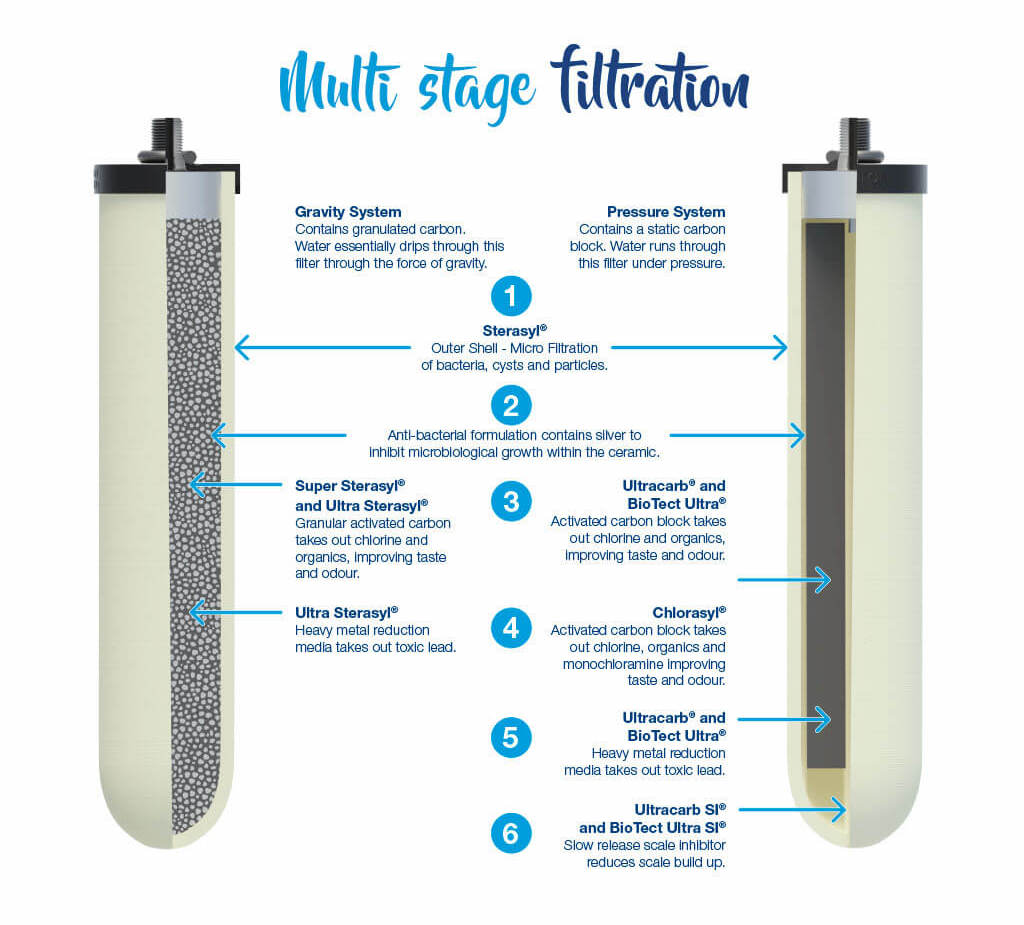
The ceramic water filter makes the water flow through many tiny pores on the cover of the ceramic cartridge. The pores are 0.5 microns in size and help remove dirt, bacteria, viruses, and debris from the water.
The interior part of the ceramic water filter is in the shape of a complex maze of sharp edges. It is designed to catch further dissolved solids that are left during the filtration process. Since the pores of the ceramic filters are relatively small, the water seeps slowly through these pores, eradicating the harmful contaminants from the water.
The ceramic water candles inside the ceramic filter are made up of internal activated carbon. They are infused with silver ions which makes the filter bacteria resistant and self-disinfectant. It also prevents the filter from developing molds and algae on its surface. Therefore, the filter helps to get rid of all the impurities as well as the living microorganisms.
You can also watch this video to learn more about ceramic filters working…
How effective are ceramic water filters?
The effectiveness of the ceramic filters depends on the manufacturing quality of the filter. These filters are primarily effective in removing harmful bacteria from water, including E. coli and cysts like sediment, lead, and cryptosporidium. However, it is not efficient in removing certain viruses.
According to the studies, these filters remove 70% of the bacterial impurities in developing countries. However, studiesprimarily remove have also shown contamination of the water when local ceramic water filters are used. Moreover, since studies primarily the filter is not chlorine resistant, it is advisable to take proper care of the filter and the canister.
Advantages Of Ceramic Water Filters
There are several benefits of ceramic water filters like…
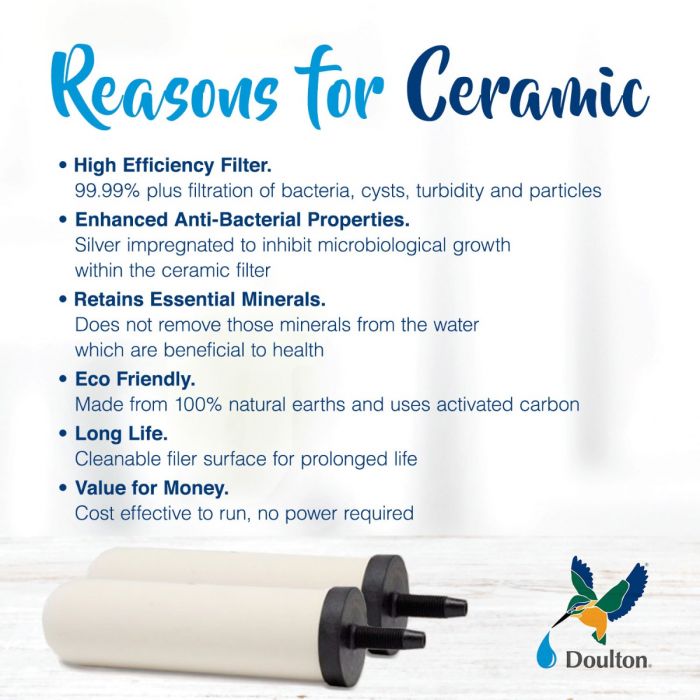
- Natural Filtration: Like activated carbon filters, ceramic water filters purify the water naturally without adding anything back to the water. They also do not remove any minerals from the water.
- Affordable: Ceramic water filters are highly affordable when compared to other water filtration systems.
- Low Maintenance: The ceramic water candles can be cleaned and easily reused. You don’t have to replace the filters after a definite time.
- Effective: Since the structure of the ceramic water filters is versatile, they are highly effective in removing bacteria, viruses, dirt, cysts, and all the harmful pathogens from the water.
- Compatible: These water filters are compatible with both UV and osmosis water filters. They can be installed anywhere in the house, be it under the sink or on the countertop.
Disadvantages Of Ceramic Water Filters
Despite several advantages, the ceramic water filters also suffer from certain limitations:
- Not Effective In Removing Chemical Components: The ceramic water filters do not remove chemical substances from the water like chlorine. But some ceramic filters contain activated carbon, which can remove chlorine and organic substances. In addition, some filters consist of ion exchange that helps eliminate heavy metals. Other filters are permeated with silver ions to prevent bacteria buildup on the surface of the filter.
- Susceptible to Breakage: If you mistakenly drop the ceramic candle, it is vulnerable to develop cracks. It makes them inefficient in filtering water. So it’s recommended you should handle the ceramic cartridges with care.
Conclusion
Ceramic water filters are extensively used in developing countries. They are highly efficient in removing dirt, dust, bacteria, and other pathogens from the water, making them potable to drink.
However, these filters do not remove viruses and chemical substances as they are too tiny to pass through the porous filters of the ceramic water filtration system.
FAQs
What are the uses of ceramic water filters?
Ceramic water filters are used both in residential and commercial. In the household, ceramic water filters are either installed under the sink or at the countertop. Commercially, a water filtration system gives an extra advantage of working on a gravity-fed filtration system. In addition, these filters do not use electricity or manual pumping to work. Thus, ceramic water filters are ideal for use when fresh and clean water is scarce.
How much does a ceramic filter cost?
A ceramic water filter costs about $7.50 to $30. Administration, awareness, and motivation of the community can also sum up the program costs. In case of emergency, ceramic water programs offer full or partial recovery to the owners. On the other hand, if the water filter is available, the cost ranges from $10 to $100, based on manufacture and purchase and the quality of the filters.
How to wash the ceramic filter candles?
To wash the ceramic filter candles, you need to remove the candles from the water filtration unit. Make sure that you handle them with care as they are prone to cracks or breakage when dropped. Now, cover the threaded part of the candle with a plastic and rubber band. It will prevent the contaminants from getting inside the filter. Next, put the filter under running water and scrub it using a cleaning sponge or a soft toothbrush. Keep away from washing towards the threaded area to prevent contamination.
How long do ceramic water filters last?
You can use ceramic water filters several times before replacement. However, to ensure that the filtration system is working correctly, it is important to clean the surface area of the filter regularly. Or else, the outer surface will get clogged with pathogenic substances, making it difficult for the water to pass through the cartridges. So ceramic water filters last for about six months to one year.
